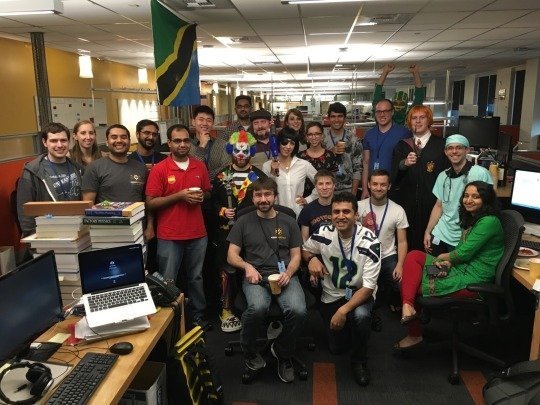
1. What were you doing before you became a Software Engineer?
Bug-related things. And by bugs I mean insects, not software bugs. I worked as an entomologist studying the evolutionary biology and taxonomy of soapberry bugs. I also worked on mosquito and tick repellent efficacy trials. That brought me to the CA Department of Public Health where I helped coordinate the state’s West Nile virus surveillance program. But since all science relies on a) data, and b) an audience, I found myself doing a lot of database and web-related work. One day I started working through a book on C++. It was awesome. Then I applied to Ada.
2. Where are you currently working and what do you do?
I’m an SDE (software development engineer) on Amazon’s Fulfillment Technologies team. We build the software that helps you get your order on time. My specific team owns a tool that enables all fulfillment centers worldwide to track outbound shipment data. If our team were a movie, it would be an action thriller about scale and distributed systems. Our main service processes hundreds of millions of messages per day. My role is to help maintain and improve this tool and the services backing it.
3. What’s your favorite part of your job?
I want to say that my job is my favorite part of my job since I really like coding, but that’s kind of tautological. So aside from my job, here are my other favorite parts of my job. First: My team. Because they’re super smart, dedicated, and fun to work with. Second: Amazon’s Leadership Principles. Because they’re effective and have helped my growth as a new dev. Third: Amazon Web Services. Because it enhances my quality of life by making my job easier.

4. Describe a typical day in your role.
My team has stand-up every morning. After stand-up, I usually work on reviewing code. Then I lunch. After lunch, I work on whatever task I’ve picked up from the sprint. For the most part, we get to choose what tasks to work on. I like to pick up the tasks that I initially perceive as scary. This is because “scary” tasks are the best for maximizing learning. Most days I’ll spend some time addressing code review comments, which I enjoy because it’s a tremendous learning opportunity. Then I might switch it up and work on another task I’ve picked up. If I’m deploying a big change soon, I might write up a CM (which is basically a detailed deployment plan with validation steps). If I’m on-call, my day consists almost entirely of working on tickets, which entails a lot of interesting problem-solving.
5. Any advice you have for others looking to enter the tech industry as a programmer.
Do a thing, even if it’s small. Use a book or online tutorial to help you build something or solve a problem. It also helps to have a mentor already in the tech industry. You can do this by going to meet-ups or networking (read: shamelessly bug all your friends and their friends and everybody you encounter until you find a mentor). Be proud of any and all achievements, no matter how small. Feel good about what you’ve learned. Be okay with feeling frustrated or overwhelmed. Keep trying, even when things are very difficult. Hard work in the right direction will always pay off.
